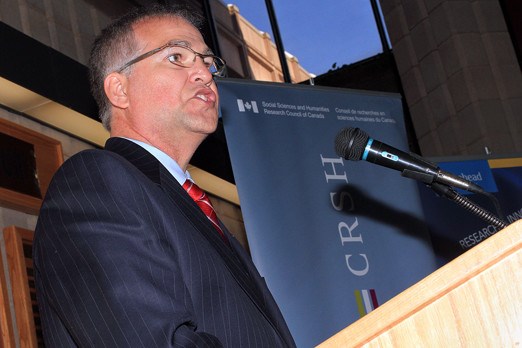Resources are the future of Canada’s North, but they come with a cost.
The country’s Arctic-dwelling residents want to realize the benefits, but at the same time are unwilling to give up their traditions and way of life, which date back centuries.
Finding a way to marry the two together is the goal of a new seven-year, $2.5 million study being spearheaded by Lakehead University researchers and paid for by the federal government’s Social Sciences and Humanities Research Council.
“They can (mix),” said LU researcher Chris Southcott, who will head the team conducting the study. “In the past they haven’t been that successful, but that’s because it’s been done in ways that were done elsewhere. What they pointed out is there is no reason why they cannot continue to have healthy, traditional communities and develop their resources if it’s done in a new innovative way. That’s what we hope to find.”
Southcott said northern Canada, whether it’s Northern Ontario or the Arctic, suffers from the resource curse. Small amounts of money come into nearby communities, but the vast majority of it is hauled out and dumped in the coffers of either government or mining companies.
With a team of 51 researchers in eight countries bordering the Arctic and partnerships with researchers in other countries, Southcott said the group will be seeking ways to improve the consultation and local hiring processes, and to find ways to keep more of the profits in the communities closest to the development.
The primary consumer of the finished study will be those communities, he said.
“We have a lot of key economic development groups that are our key partners. So we report directly to them and they will use that research in their planning,” Southcott said.
It’s the type of information that could have been used a couple of years ago when six members of the Kitchenuhmaykoosib Inninuwug first Nation were jailed for not allowing junior mining company Platinex to continue exploration on their traditional lands.
It can work both ways, he added.
“And I think one of the reasons this is an opportune time is that a lot of the private sector are thinking it’s a regulatory nightmare right now. It takes a long time to get anything developed. It’s just ridiculous. We’ve got to figure out some way to reach a consensus … so that things can be done to allow these companies to make money, but at the same time get more benefits to the communities,” Southcott said.
Gary Goodyear, the federal minister of state for science and technology, was on hand for Friday’s announcement and said the research is helping Canadians stamp a global footprint in the scientific community.
It’s also a way to help Canada establish its claim on its traditional Arctic territory.
“Absolutely,” Goodyear said. “Part of the government’s strategy is both to protect the environment and take care of the natural resources and create jobs, but sustain our sovereignty in the North.
“Prime Minister Stephen Harper has been in the North, further north than any prime minister, and we’ve been very clear to the world that this is our North and we lead in Arctic research, which we want to share with Russia and other countries around the world.”
Goodyear’s announcement, though not related to infrastructure stimulus funding, came on the heels of dozens of photo ops staged by the Conservatives across the country on Thursday and Friday. It comes just weeks before the budget is expected to be delivered in the House of Commons, perhaps sparking a federal election.
Sign in or register
- Messages
- Post a Listing
- Your Listings
- Your Profile
- Your Subscriptions
- Your Likes
- Your Business
- Support Local News
- Payment History
Registered Users
Already have an account?
New Users
Create a free account.
